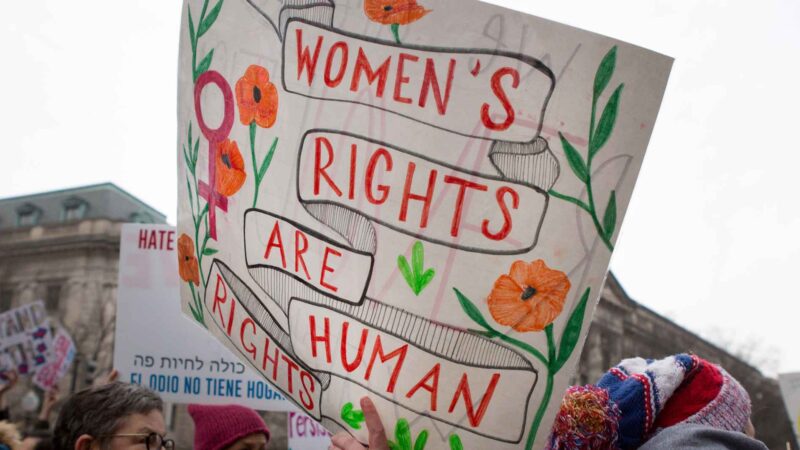Women's Rights
Throughout the ACLU’s history, great strides have been made to protect women’s rights, including women’s suffrage, education, women entering the workforce, and most recently, the Me Too Movement.

What you need to know
78 cents
Women still make just 78 cents for every dollar earned by men. Black women earn only 64 cents and Latinas only 54 cents for each dollar earned by white men.
1 in 4
The U.S. Department of Justice reports that approximately one in four homeless women is homeless because of violence committed against her.
1,000+
Over 1,000 public K-12 schools in the United States have single-sex education programs. Many rely on discredited science and gender stereotypes.
“Women’s rights are an essential part of the overall human rights agenda, trained on the equal dignity and ability to live in freedom all people should enjoy.”
Ruth Bader Ginsburg
Throughout the ACLU’s history, great strides have been made to protect women’s rights, including women’s suffrage, education, women entering the workforce, and most recently, the Me Too Movement. Despite this incredible progress, women still face discrimination and are forced to constantly defend challenges to their ability to make private decisions about reproductive health.
Overall, women make just 78 cents for every dollar earned by men. Black women earn only 64 cents and Latinas earn only 54 cents for each dollar earned by white men. Nationally, Georgia is among the worst states in terms of reproductive health. It has the highest maternal mortality rate in the country and in 2019, the Georgia legislature enacted one of the most restrictive anti-choice bills in the country. The ACLU was the lead organization in winning a stay of this 6-week ban.
In her affirmation of reproductive rights in Planned Parenthood v. Casey, Justice Sandra Day O’Connor wrote, “The ability of women to participate equally in the economic and social life of the Nation has been facilitated by their ability to control their reproductive lives.” All around us, women’s lives have changed as a result of reproductive freedom, autonomy, and progressive movements for women’s rights and civil rights.
In 1972, attorney Ruth Bader Ginsburg founded the ACLU Women’s Rights Project which works to ensure that women and their families can enjoy the benefits of full equality and participation in every sphere of society. Around the same time, the ACLU of Georgia was supporting attorney Margie Pitts Hames in her challenge to Georgia’s abortion statute. That effort resulted in Doe v. Bolton, a companion case to Roe v. Wade.
In 1972, the U.S. Congress passed the Equal Rights Amendment (ERA). A few years later, ERA Georgia was formed. Jean Childs Young and Atlanta civic leader Sherry Frank worked with a bi-racial coalition of women to promote the Equal Rights Amendment in Georgia. The Georgia General Assembly rejected the ERA in 1982, and the amendment to the U.S. Constitution still has not yet been ratified.
In early 2019, the bill that became Georgia’s abortion ban law began moving through the General Assembly. Despite the valiant efforts of reproductive rights and justice organizations, allies, and pro-choice members of the state legislature, the legislation passed the House of Representatives by two votes, setting the stage for the governor’s signature on May 7, 2019.
On June 28, 2019, the ACLU and partners filed SisterSong v. Kemp, a federal lawsuit challenging the constitutionality of the abortion ban.
In October 2019, the U.S. District Court in Atlanta blocked the abortion ban, which was scheduled to take effect January 1, 2020. The court’s ruling blocks the law’s implementation as litigation proceeds.
The COVID-19 pandemic has revealed even greater gender-oriented fissures in our society. Women, and particularly women of color, are disproportionately impacted by the pandemic—they are more likely to lose their jobs, more likely to work in essential jobs on the frontlines of the pandemic, and more likely to struggle with school closures and the loss of childcare for their children. COVID-19 gives this work even more urgency.
The Latest

Crossover Day: Watching the Bills that Impact Constitutional Rights

ACLU of Georgia continues democracy-for-all fight at Capitol; Crossover Day looms

Press Release: Georgia Advocates Thank Senators Warnock and Ossoff for Leadership on the Pregnant Workers Fairness Act; Urge Senate Passage in September
Stay Informed
Sign up to be the first to hear about how to take action.
By completing this form, I agree to receive occasional emails per the terms of the ACLU’s privacy statement.
By completing this form, I agree to receive occasional emails per the terms of the ACLU’s privacy statement.
